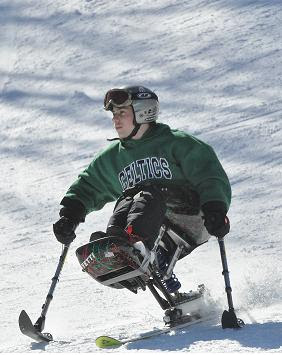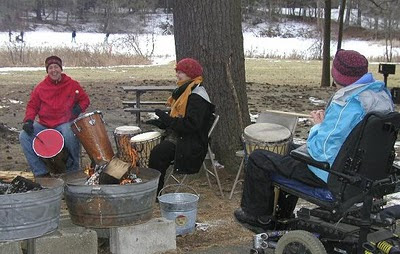
 A growing group of power wheelchair users met at the Cronin Rink in Revere, Massachusetts, yesterday to play another round of a new game yet to be named. Is it power ball, power play, ice ball, ice soccer, or something else? Vote on your favorite name to the right!
A growing group of power wheelchair users met at the Cronin Rink in Revere, Massachusetts, yesterday to play another round of a new game yet to be named. Is it power ball, power play, ice ball, ice soccer, or something else? Vote on your favorite name to the right!
Whatever its name-to-be, the game was played this time with two teams of four, crossways on the rink. Four players might be more cumbersome on a shorter ice field than three per team, but both sizes work. Thirty minutes seems like about the most time in which people can play together before cold sets in and a break is necessary.
We had four new players, Jeanette, Justin, Joe, and Brian, joining our returning enthusiasts Barry, Richard, Nick, and Tom. Jeanette became the first woman (who uses a power chair in daily life) to play and I noticed she gave the loudest whoops when a goal was scored. Everyone really enjoyed themselves. Brian, who came with others from Spaulding Rehab Hospital to try the game, said simply "I had a blast!" It seems to us that there aren't enough opportunities for people in power wheelchairs to engage together in play.
We are still playing as-is, without any protective devices, in a careful exchange that often involves contact on either side of the fitness ball, which cushions nicely and pushes chairs apart. However gently we play, there is still jostling between players seeking control of the ball. Broken reflectors and a broken fender in our first two games of play cause us to feel it prudent to invest in power soccer guards.
Though to the outside viewer, play may appear slow, much is happening between players who close in on the ball and have to work their way out of a scrum. Someone has to give or push, or use humorous persuasion perhaps, to free the ball back into play. Breakaways happen occasionally and goals are mostly left untended. Although the game has no formal rules yet, a few ideas are emerging for improvement.
You can read about the first round of Power Chairs on Ice here. Eventually this game may break out of doors. In the meantime we will continue on a monthly basis in Revere. To get involved, contact Tom McCarthy, Director of DCR's Universal Access Program, at 413-545-5758 or thomas.j.mccarthy@state.ma.us, or myself at 413-545-5758 or marcy.marchello@state.ma.us
You can read about the first round of Power Chairs on Ice here. Eventually this game may break out of doors. In the meantime we will continue on a monthly basis in Revere. To get involved, contact Tom McCarthy, Director of DCR's Universal Access Program, at 413-545-5758 or thomas.j.mccarthy@state.ma.us, or myself at 413-545-5758 or marcy.marchello@state.ma.us
Please share your experiences and ideas with regard to this new game here in the comments box by clicking on the underlined amount of "comments" below.











